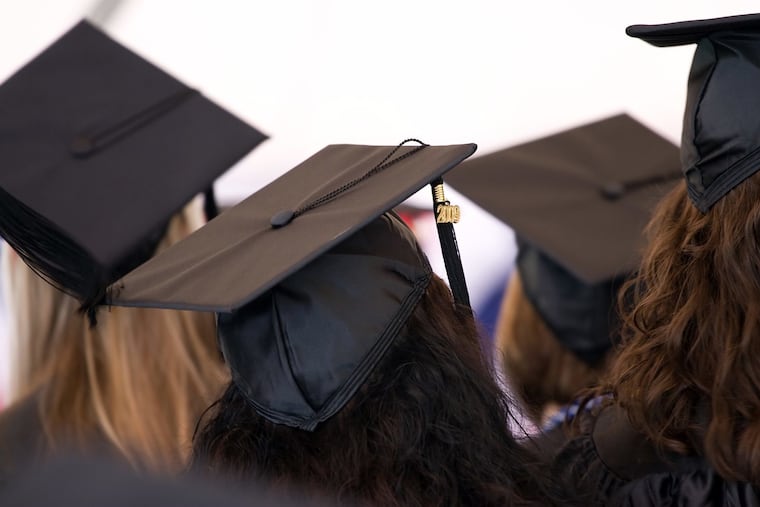Trump suspends interest on all federal student loans to ease financial impact of coronavirus
The Trump administration said Friday it will waive interest on all federal student loans in an effort to stem the financial impact of the coronavirus on the 42 million Americans holding $1.5 trillion in federal education debt.

The Trump administration said Friday it will waive interest on all federal student loans in an effort to stem the financial impact of the coronavirus on the 42 million Americans holding $1.5 trillion in federal education debt.
"To help our students and their families, I've waived interest on all student loans held by federal government agencies," President Donald Trump said during a Rose Garden news conference Friday. "That's a big thing for a lot of students that are left in the middle right now."
Interest rates on all federal loans made to undergraduates, graduate students and parents will be set at zero until further notice, according to the Education Department. Students attending college will not have interest accrue, while any payments borrowers make from here on will go strictly to the principal of their loans.
The waiver would also apply if borrowers decide to enroll in a program to temporarily halt their payments. Borrowers will receive notice from their loan servicers, the middlemen who collect payments on the government's behalf, in coming days.
Trump announced the unprecedented move after declaring a national emergency amid the spread of the coronavirus. The pandemic has led to widespread disruptions of industries and shaken the financial markets. As health officials say the worst of the outbreak may be yet to come, some fear the implications for workers and the broader economy.
Treasury Secretary Steven Mnuchin alluded to some form of student debt relief during an interview Friday on CNBC. He said temporary suspension of student loan payments was on a "list of 50 different items" he planned to bring to the president.
After Mnuchin's appearance on CNBC, the administration instructed the Education Department to figure out whether the agency had the authority to take action, according to people familiar with the issue who were not authorized to speak publicly. The White House decided to focus on interest rates, rather than suspend payments.
The White House declined to comment when asked about its decision.
Education Department spokeswoman Liz Hill did not confirm the timeline of events but said the department has been "working closely with our interagency partners on ways we can best support students and borrowers and we will continue to do so."
Suspending payments, she said, could have been disruptive for people working toward Public Service Loan Forgiveness, a federal program that cancels the remaining balance of a borrower's debt after 120 on-time monthly payments. The program requires borrowers to be enrolled in specific repayment plans, primarily those that cap monthly loan payments to a percentage of income. Postponement of payments would result in a longer path to forgiveness.
The Education Department can suspend federal student loan payments and accruing interest using the same authority Sen. Elizabeth Warren, D-Mass., said she would employ to cancel education debt.
Waiving interest on student loans could prove useful in Trump's bid for reelection as he courts young voters. The president has demanded aides present a plan to tackle student debt and the rising cost of college education, worrying he has nothing that could compete with the expansive plans from Democrats vying for the office.
But Friday's announcement landed with a thud within student advocacy circles.
Advocates panned the waiver as shortsighted and said it would have negligible impact on people struggling with loan payments. Instead, they suggested other measures the administration could adopt, which could include ending the seizure of tax refunds or wages of borrowers who default on their loans. Others are calling for outright or temporary cancellation of federal student loans to help stimulate the economy.
"With so many facing the prospect of lost wages or lost jobs, the government can and should do more than waive interest, which is merely an economic Band-Aid on the gaping financial wound the pandemic is causing," said Alexis Goldstein, senior policy analyst at the liberal think tank Americans for Financial Reform. "The Education Department has the authority to cancel student debt, and using it would mean both short- and medium-term economic stimulus that helps all Americans."
Goldstein said federal student debt cancellation would free up money for additional consumption, an important boost to consumer spending at a time when the economy is contracting.
Federal Trade Commissioner Rohit Chopra agreed the government can do more than waive interest to help borrowers and the economy.
“Student loan borrowers got slammed in the last recession. Even with deferment and forbearance options, millions were forced into default, destroying their financial futures,” Chopra, a former student loan ombudsman at the Consumer Financial Protection Bureau, said Friday in a tweet. “Canceling student debt payments, not just delaying them, must be on the table.”